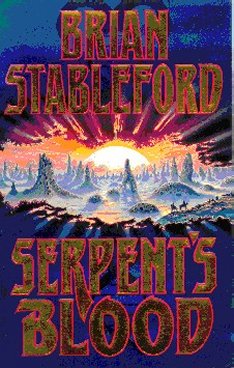Review by Ian Braidwood
Cast of Characters:
Andris Myrasol, Ereleth,
Princess Lucrezia, Dhalla, Hyry Keshvara, Sergeant Purkin, Guardsman
Herriman, Captain Jacom Cerri, King Belin of Xandria, Burdam Thrid,
Checuti, Carus Fraxinus, Aulakh Phar, Monalen, Zadok Sart, Guardsman
Kirn, Seril Sart, Guardsman Kristoforo, Merel Zabio, Guardsman Aaron,
Guardsman Pavel, Guardsman Luca, Elema, Koraismi, Djemil Eyub, Jume
Metra, Ssifuss, Ssumssarum, Mossassor, Seth.
It's
remarkable how you come to view things differently.
When
I started this project, I was disappointed that I'd close my loop
of novel reviews with Chimera's Cradle, the last book of Genesys.
(In fact that is wrong, The Hunger and Ecstasy of Vampires will close
the loop.) I didn't at that time view Genesys as anything to get excited
about. However, after my stratospheric expectations for The Carnival
of Destruction and the distraction that is Firefly, reading Serpents
Blood has been a real pleasure. This book is fun and just what the
doctor ordered.
I don't think I'll surprise or upset anyone when I say that Genesys
is a deliberate attempt to appeal to the growing fantasy readership
of the time, whilst including science fiction elements which do so
much to motivate and inform Brian's writing.
Since
Genesys is presented as a fantasy, it is so structured as to include
elements common to the genre: an expansive history - including a mythical
past, a wide and diverse cast of characters, varied and often lurid
environments, and of course, a quest.
The world of Genesys is unnamed, but it is clear from the only remaining
fragments of lore that we are talking about a planet to which humanity
is a new resident; though time enough has passed since humanity's
arrival for them to have largely forgotten their origin.
The
historical amnesia is a product of the world itself. Its ecologys
are dominated by the processes of decay, so people have been forced
to record their dealings on papers and parchments, which in turn need
to be recopied often if the information is to be preserved. The molds
and rots are so voracious, that even the mountains are eaten away
as fast as they can be raised and the largest structures on land are
the Dragomite mounds; themselves products of a fearsome form of life.
What chance then for something as intricate as an integrated circuit,
where life even has geology on the run?
The story centres on Andris Myrasol, an exiled prince of the little regarded
realm of Ferentina. Andris has come to Xandria to find his uncle Theo,
who also had to leave Ferentina under similar circumstances some years
earlier. Having just arrived, Andris is relaxing in a quiet dockside
pub, when a fight breaks out and in the confusion, he is knocked unconscious.
When he wakes up, Andris finds himself under arrest and after a marsupial
trial, goes to jail - where in typical Stableford fashion - he has
to pay for his board.
Princess
Lucrezia has conjugal intentions for Andris and implores her father
Belin to release him into her custody; not that she has the slightest
idea of uniting Xandria and Ferentina through marriage. She is already
intended for the prince of another small kingdom; even though she
dreams of becoming a traveller, like the trader Hyry Keshvara. Lucrezia's
plans for Andris involve mysterious seeds Keshvara has bought from
lands far to the south, beyond the mysterious and previously impenetrable
Dragomite Mounds.
Another person with - somewhat wistful
- conjugal intentions is Jacom Cerri, captain of the Palace Guard.
His father has recently bought him his commission and reality hasn't
had long enough to overwrite his fantasies - much to the chagrin of
Sergeant Purkin and his men of indifferent loyalty; who are so procedure-bound
as to almost be institutionalised.
The role of spanner-in-the-works is taken by Checuti, grandiose thief
and gang leader, whose efforts in the field of wealth redistribution
lead our heroes southward into the dragomite hills…
Reading
this novel a second time has been an eye-opening experience for me,
as I gave Genesys scant attention the first time around, following
on as it did from Carnival. This time, I can see the structure underlying
the apparent chaos and the theme driving the story.
Certainly
by me, this series has been underrated and I look forward to its rediscovery.
David Langford's review of Serpent's Blood is HERE
|



